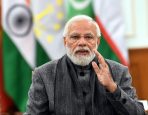
Covid vaccination linked with reduced household transmission: Study
PTI, Oct 12, 2021, 1:51 PM IST

London: People without immunity against COVID-19 are at a significantly lower risk of infection and hospitalisation as the number of family members with immunity from a previous infection or full vaccination increases, according to a nationwide study in Sweden.
The research, published in the journal JAMA Internal Medicine, found that there was a dose-response association between the number of immune individuals in each family and the risk of infection and hospitalisation in non-immune family members.
Non-immune family members had a 45 to 97 per cent lower risk of infection and hospitalisation, as the number of immune family members increased, the researchers said.
“The results strongly suggest that vaccination is important not only for individual protection, but also for reducing transmission, especially within families, which is a high-risk environment for transmission,” said Peter Nordstrom, a professor at Umea University in Sweden.
The researchers noted that there is a vast body of research showing that vaccines strongly reduce the risk of COVID-19.
However, less is known about the influence of vaccination on transmission of the virus in high-risk environments, such as within families, they said.
The latest research is a nationwide, registry-based study of over 1.8 million individuals from more than 800,000 families.
The researchers combined registry data from the Public Health Agency of Sweden, the National Board of Health and Welfare, and from Statistics Sweden, which is the government agency that oversees statistical data.
They quantified the association between the number of family members with immunity against COVID-19 and the risk of infection and hospitalisation in non-immune individuals.
The study accounted for differences in age, socioeconomic status, clustering within families, and several diagnoses previously identified as risk factors for COVID-19 in the Swedish population.
The researchers noted that it appears that vaccination helps not only to reduce the individual’s risk of becoming infected, but also to lower transmission.
This “in turn minimises not only the risk that more people become critically il, but also that new problematic variants emerge and start to take over,” said Marcel Ballin, doctoral student at Umea University.
“Consequently, ensuring that many people are vaccinated has implications on a local, national, and global scale,” Ballin, co-author of the study, added.
Udayavani is now on Telegram. Click here to join our channel and stay updated with the latest news.
Top News
Related Articles More

2 Indian restaurants in Colorado duped investors of USD 380K: Officials

WATCH: 5 runaway military horses cause mayhem in London

Don’t blame Dubai’s freak rain on cloud seeding

Who would lead if US stepped off world stage? asks Biden

Sexual harassment case: HC declines to suspend prison sentence of former TN special DGP
MUST WATCH
Latest Additions

Delhi HC adjourns hearing on Facebook, WhatsApp pleas challenging IT rules on traceability to August

Congress, SP harbor negative sentiments, alleges Yogi Adityanath

‘We know every vote counts and take our responsibility very seriously’

Gukesh credits Vishwanathan Anand for his Chess journey

Judge handling Gyanvapi survey alleges receiving international calls























